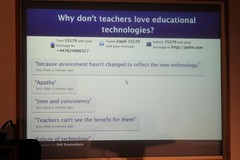 We have the technology. We have the capability… all we need is love is the title of the talk I gave at the Future of Technology in Education 2010 on Friday.
We have the technology. We have the capability… all we need is love is the title of the talk I gave at the Future of Technology in Education 2010 on Friday.
FOTE10 is more technology focussed then many of the events I attend but my talk concentrated on teachers/lecturers and their importance in the successful implementation of educational technologies. My talk in brief:
We have the technology
The technology is here and continues to arrive and has great potential uses in education. But teachers don’t fully utilise what we already have and understanding why is necessary to ensure we realise the full benefits of future technologies for education.
We have the capability
By this I was meaning the people in the room. Education is full of both technology & pedagogy experts. Between us we understand the potential of technologies and have a good idea of how to apply them to education.
During this section I got the delegates to chat briefly about where they currently focussed their time/resources in terms of the leading edge vs the trailing edge. I was hoping to discover how many thought they were spending too much time on innovations, who was spending too little & who felt they had the balance about right.
Unfortunately I only remembered to ask one of the two necessary follow-up questions! So I discovered that only handful thought they were spending too much time on innovations but not how the rest split between ‘too little’ & ‘balance right’. Oh well.
All we need is love
I suggested that there was a lack of desire & enthusiasm from many lecturers for educational technologies, particularly beyond the delivery of lecture notes and the like. I then started to explore at the possible reasons why. I argued that it wasn’t a question of teachers not loving teaching nor disliking technology (and included some stats from the LSE which show that staff use smartphones & twitter as much if not more than the general population).
I then asked the audience for their input which I collected via polleverywhere.

I was using the free version that only allows for 30 responses but they weren’t all used, so feel free to add your thoughts. I will write another post about these responses shortly.
I ended the talk by asking delegates to go away and think about how we overcome the problems they had identified in my question. But before leaving the stage a made my own tongue-in-cheek prediction for the future:the continued growth (literally) of touchscreen devices: iPhone > iPad > ???
Hi Matt,
This is a really interesting question. My thoughts for what they’re worth. I guess for the average academic with interests in Learning Technology, a major reason for failure to utilise Learning Technology is simply lack of time. The pressures of teaching and research mean that I would love to explore more of the applications and pedagogical benefits they may bring, but I find the costs of finding out what’s out there, how to use it and integrate into my teaching and the university’s VLE disincentivise me from exploring as much as I’d like. I also find that the current eco-sphere of learning technology is almost too diverse and the pace of development so intense that it is rather intimidating. I guess I would like Learning Technologists to emphasise the learning outcome benefit of a technology first, and be able to provide a ‘it works out of the box’ technology that has extremely low start-up costs, and that can be developed and combined with other technologies coherently and incrementally. In my experience this is something that Moodle provided very successfully whilst the current VLE I use (I’m not sure if I should mention it!) very much fails to provide. So it’s not just love that is needed, but something that is loveable.
Many thanks for commenting Phil; it’s good to get a lecturer’s perspective on this! I think you’ve hit on some key things that we need to address, particularly being better at getting the benefits across. I touched on time in the actual talk. There is a significant time commitment but I’m not wholly convinced by the time-poor argument. I don’t want to dismiss it completely but everyone has to make decisions about how they use their time, so for me, it’s more about how we convince people to put more priority on learning technologies.